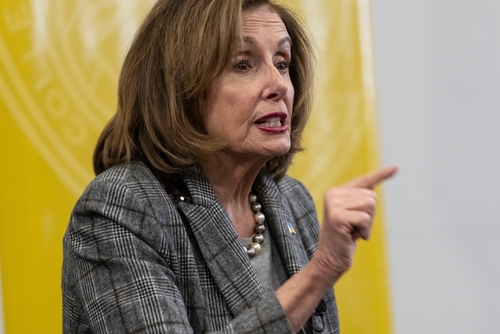
In a surprising move, former House Speaker Nancy Pelosi has openly opposed a California bill aimed at tightening regulations on Big Tech companies, raising eyebrows among her Democratic peers. Pelosi's stance against the proposed legislation, which is designed to bolster privacy rights and restrict the power of tech giants, is drawing sharp criticism from progressive lawmakers and advocacy groups alike. The bill, known as the California Journalism Preservation Act, has gained momentum in Sacramento, with proponents arguing it would help local journalism thrive by forcing tech companies to pay for the news content they distribute.
Pelosi's opposition, which she voiced on Monday, August 19, 2024, highlights a growing rift within the Democratic Party over how to address the influence of tech companies like Google and Meta. The California Journalism Preservation Act, authored by Assemblymember Buffy Wicks, would require digital platforms to compensate news outlets for their content, a move supporters say is crucial for sustaining local journalism in the digital age.
Big Tech political ad warns local news is 'under siege,' opposes California bill https://t.co/sjOkt2GpeQ
— ABC10 (@ABC10) August 14, 2024
However, Pelosi's dissent stems from concerns that the bill might inadvertently hurt smaller publications and lead to unintended consequences for the news industry. According to Pelosi, the legislation could end up benefiting larger media conglomerates at the expense of independent outlets, further consolidating power within an already concentrated industry.
Critics of Pelosi's stance argue that her opposition aligns too closely with the interests of Big Tech, a sector that has been a significant donor to her campaigns over the years. Progressive lawmakers like Ro Khanna and Alexandria Ocasio-Cortez have been vocal in their disappointment, suggesting that Pelosi's position undermines efforts to hold tech giants accountable for their outsized influence in the economy and on public discourse.
So not only is Bill Clinton a pedophile, but the US government, the DNC, the MSM, and Big Tech, went out of their way to hide this reality from you.
They also smeared, destroyed, or murdered, all the journalists who tried to expose this reality.
It’s not a theory anymore. pic.twitter.com/pB4N4uotJG
— Clandestine (@WarClandestine) January 4, 2024
The California Journalism Preservation Act has been championed by a coalition of local journalists, advocacy groups, and media organizations who argue that tech companies have long profited from distributing news content without fairly compensating the creators. Assemblymember Wicks has emphasized that the bill is modeled after similar legislation in Australia, which successfully pressured companies like Google and Facebook to negotiate with news publishers.
Pelosi, however, has expressed doubts about the bill’s potential effectiveness, pointing out that the Australian model may not be entirely applicable to the U.S. market. She has called for a more nuanced approach that considers the unique dynamics of the American media landscape and has suggested that alternative solutions should be explored to ensure the sustainability of local journalism.
Despite Pelosi's concerns, the bill has garnered significant support from various quarters, including labor unions and media advocacy groups, who see it as a necessary step to curb the monopolistic tendencies of tech giants. Proponents argue that without such legislation, local news outlets will continue to struggle financially, leading to further newsroom closures and a decline in quality journalism.
The tech industry has predictably opposed the bill, with representatives from Google and Meta warning that the legislation could disrupt the free flow of information online and potentially lead to higher costs for consumers. They also argue that the bill could set a dangerous precedent by forcing tech platforms to pay for content that users share voluntarily.









Can’t wait for the day when this hag is gone